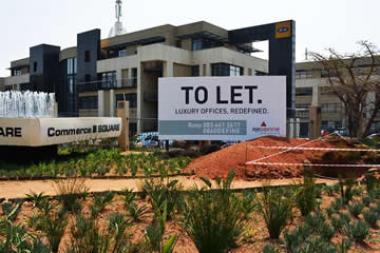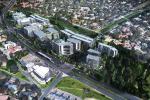Property owners battle Gauteng office vacancies
 Iconic business areas including Rivonia, Sunninghill, Woodmead and Randburg, are under pressure, having fallen out of favour with prospective tenants.
Iconic business areas including Rivonia, Sunninghill, Woodmead and Randburg, are under pressure, having fallen out of favour with prospective tenants.
Economic slowdown is being reflected in Gauteng’s office rental sector, with landlords struggling to fill once-popular buildings.
Iconic business areas including Rivonia, Sunninghill, Woodmead and Randburg, are under pressure, having fallen out of favour with prospective tenants.
“Rivonia and Sunninghill are two nodes which stand out for me as having experienced recent struggles,” said Edward Ward, head of lease advisory at JLL SA.
In the South African Property Owners Association’s (Sapoa’s) latest report, Rivonia’s office vacancy rate at the end of the fourth quarter of last year was 18.1%. This was barely an improvement on 18.5%, which was the rate at the end of the third quarter of last year.
Sunninghill’s total vacancy rate was 6.1%, compared with 6% for the quarter before. There was relatively little development planned for both nodes.
“They can recover, but some work will be required. Rivonia’s problems, for example, have resulted from things like the age of its buildings, insufficient parking ratios and, ultimately, it not being occupier-efficient,” Mr Ward said.
Sunninghill has also faced challenges, with a vacancy rate that has hovered around 6% for a year.
Woodmead has also struggled, with its overall vacancy rate at 13.4% as at the end of last year. Randburg’s total vacancy rate is sitting at about 9%.
The national office vacancy rate sat at 10.5% at the end of last year, according to Sapoa, barely changed from the 10.6% recorded in the third quarter.
In fact, for the past five years, the national vacancy rate has moved sideways, since it increased to 9.8% after the 2008-09 recession.
A lack of new hires for companies amid an economy set to grow less than 1% this year has stunted demand for bigger space.
While Gauteng, which accounts for about 70% of total office space in SA, has struggled, the Western Cape has been a strong performer.
Century City stands out, with an overall vacancy rate that has fallen from 12.2% at the end of the third quarter of last year to 7.1% at the end of the fourth quarter. Bellville and the Cape Town CBD have also improved.
Emira Property Fund CEO Geoff Jennett said for a real shift of improvement, it needed to happen in Gauteng.
He said the sector was highly competitive. “Tenants are more sophisticated now. They expect more from their offices.”
Redefine Properties CEO Andrew Konig said it had become more difficult to raise rentals in the office market.
“The office market continues to be extremely tough, with no rental growth in most nodes, with Rosebank being a notable exception,” he said.
Growthpoint Properties MD Estienne de Klerk said older B-grade offices were struggling the most.
“We have been able to bring our office vacancies down quite considerably but we are operating in P (premium) and A-grade space, which has helped us, as we have done deals for large corporates. It is the B-grade space which I believe is proving to be really difficult,” he said.
He said while the Western Cape might have done better than other provinces, it also had much less office space than Gauteng.
Commenting on Sandton, where Growthpoint has a large number of offices, Mr de Klerk expects to see a battle for vacant space in the future.
“A number of large companies have or are moving to bigger premises in Sandton. There will be a battle in the future for the properties that are left behind,” he said.


















